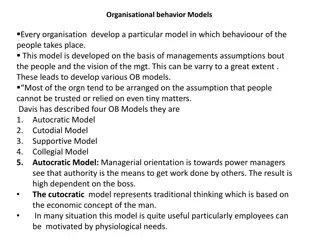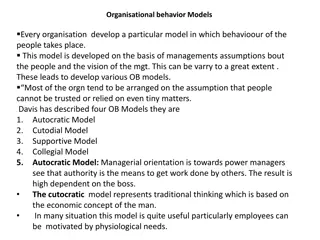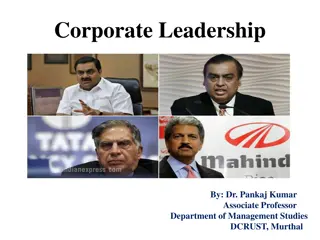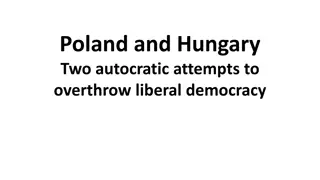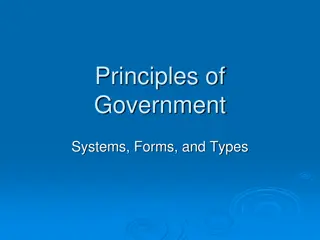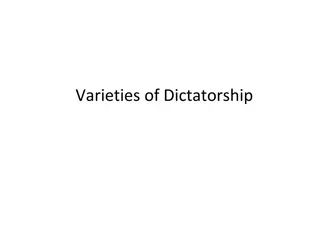Understanding Management, Leadership, and Organizational Success
The process of achieving organizational objectives through effective management and leadership is crucial for success. Management roles, such as top management, middle management, and supervisory management, each play a distinct role in implementing strategic plans and motivating employees. Skills l
9 views • 26 slides
Understanding Leadership and Communication in Information Systems
Leadership in information systems involves guiding, influencing, and inspiring individuals towards common goals, while effective communication is essential for exchanging information and ideas. Qualities like vision, collaboration, and empathy make leaders successful. Different leadership styles suc
0 views • 14 slides
Leadership Styles and Theories: An Overview
Explore the concept of leadership styles and theories, focusing on the different types of leadership styles such as autocratic, democratic, and laissez-faire. Learn about the components of a manager's leadership style, including motivation approaches, decision-making styles, and areas of emphasis in
4 views • 24 slides
Exploring Leadership Styles: Tannenbaum & Schmidt Continuum
Discover the Tannenbaum & Schmidt Continuum of Leadership, comparing it with McGregor's Theory X and Theory Y. Explore the dynamics of autocratic and democratic leadership styles, understanding the varying levels of leader involvement and employee empowerment. Delve into the concepts of employee-cen
4 views • 14 slides
Understanding Organisational Behavior Models and Perception in Management
Every organization develops a management model based on assumptions about people and the vision of the management. Models like Autocratic, Custodial, Supportive, and Collegial focus on different approaches to leadership and employee management. Perception plays a crucial role in how individuals inte
0 views • 9 slides
Understanding Organisational Behavior Models and Perception Process
Every organization develops a behavior model based on management's assumptions and vision. Davis described four OB models: Autocratic, Custodial, Supportive, and Collegial, each representing different managerial orientations. Perception is a cognitive process of selecting, organizing, and interpreti
0 views • 9 slides
The Berlin Revolutions of 1848: A Historic Perspective
The Berlin Revolutions of 1848 were part of a series of widespread uprisings across Europe, driven by a mix of liberal and working-class goals. The revolutions aimed to challenge the existing autocratic political structure in the German Confederation and the Austrian Empire. Despite initial hopes fo
1 views • 14 slides
Insights on Corporate Leadership and Management Practices by Dr. Pankaj Kumar
Explore leadership quotes, styles, and the importance of mission and vision statements in corporate and political settings. Learn about autocratic and democratic leadership styles, and delve into the concepts of transactional vs. transformational leadership. Discover the significance of mission stat
0 views • 27 slides
Comparing Autocratic Attempts in Poland and Hungary
Poland and Hungary exhibit common ideological frames in their autocratic attempts, focusing on regime change rather than government shifts. These attempts utilize ethnonationalism, Euro-skepticism, and xenophobia to justify their actions. The two countries also showcase different types of post-commu
0 views • 15 slides
The Historical Roots of the Russia-Ukraine Conflict
Exploring the historical events from the formative twin crises in 1993-94 to the Ukrainian and Russian resolutions, this analysis compares Ukraine's democratic progress with Russia's autocratic tendencies. The post-Soviet revolutions in Ukraine and the long history of ruling powers in the region she
0 views • 9 slides
Comprehensive Overview of Leadership Theories and Styles
Leadership encompasses the ability to influence a group towards achieving goals by knowing oneself, communicating vision, building trust, and taking effective action. Various leadership styles include Autocratic, Democratic, Free-Rein, and Paternalistic, each with distinct decision-making approaches
0 views • 19 slides
Understanding Leadership Competencies: Types of Leaders and Activities
Explore the concept of leadership, identifying different types of leaders - Laissez-Faire, Autocratic, Democratic, and Paternalistic. Learn about their characteristics and how they handle various situations. Engage in group discussions and activities to practice different leadership styles, enhancin
0 views • 13 slides
Tyrants on Twitter: Safeguarding Democracies from Information Warfare
Exploring the central argument of the new Cold War with China, focusing on military, economic, and information competition. The discussion addresses the threat posed by Chinese and Russian information warfare to Western democracies, emphasizing the need for regulatory harmonization among leading Wes
0 views • 17 slides
Principles of Government Systems and Types Explained
Explore the fundamental features of different government systems such as unitary, confederal, federal, autocratic, oligarchic, democratic, presidential, and parliamentary. Learn about the various forms of government, theories on the origin of states, and key characteristics of democratic government
0 views • 21 slides
6th Grade Social Studies & Social Emotional Learning Curriculum Overview
The curriculum covers topics such as different forms of government, citizen participation in autocratic and democratic governments, and the comparison of parliamentary and presidential democratic systems in countries like the United Kingdom, Germany, and Russia. Students engage in various activities
0 views • 7 slides
Types of Dictatorships: A Comprehensive Overview
Explore the various classifications and typologies of dictatorships, including monarchic, military, and civilian regimes. Learn how dictators maintain power through support coalitions and understand the differences between these autocratic forms of governance. Delve into examples of monarchic dictat
0 views • 117 slides




